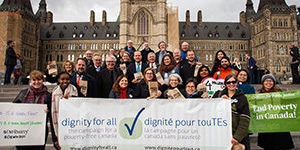From the Catalyst, Summer 2017
Finding Home in the Promised Land: A Personal History of Homelessness and Social Exile
By Jane Harris
J. Gordon Shillingford, 2015
Reviewed by Darlene O’Leary
“I fought my way out of the wilderness, but I still wear cuts inside my body and soul.”
In Finding Home in the Promised Land, author Jane Harris shares her deeply personal story of domestic violence, poverty, homelessness, and social exile. She also offers a narrative and historical glimpse of her Scottish immigrant ancestors, particularly her great-great grandmother. Their struggles in the new “promised land” of pre- Confederation Canada both parallel and contrast Harris’s own quest for home.
As the book moves between the past and the present, Harris searches for answers about the brutal reality of poverty. She offers an account of her own experience with what she calls the “poverty industry.” In the process, she also provides disheartening facts about poverty in Canada and who is most impacted.
Harris is both a victim of and resistant to the deeply held notion that poverty is a personal failure. She recognizes that surviving and thriving in any context requires not just hard work and determination, but it requires social relationships and supports.
Harris’s analysis of social and institutional failures is broad ranging, and her personal experiences illustrate these failures powerfully.
In pointing toward solutions, Harris makes a case for more affordable housing, along with a housing benefit for those in need. She also recommends exploring a guaranteed annual income as an alternative to the “shame-based poverty industry.”
Ultimately, this book is a personal search for home and an exploration of the social exile of those most vulnerable.




